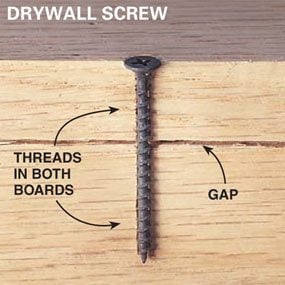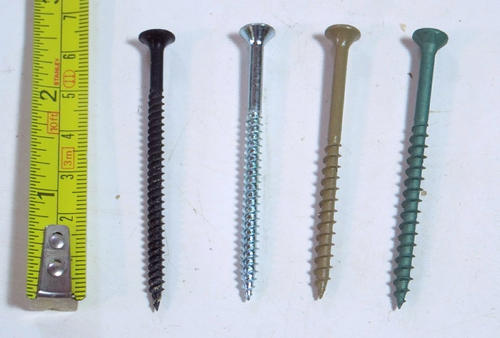If you’ve ever wondered, “Are drywall screws good for plywood?” you’ve come to the right place! Whether you’re working on a DIY project or just curious about different types of screws, it’s important to know which ones work best for specific materials like plywood. In this article, we’ll explore the compatibility of drywall screws and plywood, and whether they’re a suitable choice for your woodworking needs.
Now, let’s dive into the world of screws and plywood to find out if drywall screws are up to the task. Whether you’re a beginner or an experienced woodworker, understanding the right type of screw for the job can make all the difference. So, let’s get started and explore the pros and cons of using drywall screws with plywood.
So, if you’re eager to find out if drywall screws are the way to go when it comes to working with plywood, keep reading! We’ll explore the benefits and potential drawbacks of using drywall screws for this particular type of material. Let’s get into the nitty-gritty and discover the best screw choice for your plywood projects.

Are Drywall Screws Good for Plywood? Exploring the Compatibility and Benefits
Drywall screws are commonly used for securing drywall to studs, but can they be used for plywood as well? In this article, we will delve into the compatibility of drywall screws with plywood and discuss their benefits. Whether you’re a DIY enthusiast or a professional carpenter, understanding the suitability of different types of fasteners for specific materials is crucial for achieving optimal results. So, let’s explore whether drywall screws are a good option for plywood projects.
1. Understanding Drywall Screws and Plywood
Drywall screws are designed specifically for fastening drywall sheets to metal or wood studs. They are typically made of hardened steel and have a coarse thread that provides strong holding power. On the other hand, plywood is a versatile construction material made from thin layers of wood veneer glued together. It’s known for its strength, stability, and durability. While both drywall screws and plywood have their unique properties, it’s important to assess their compatibility before using them together.
When considering the use of drywall screws with plywood, it’s essential to take into account the thickness of the plywood and the length of the screws. Drywall screws may not provide sufficient grip if the plywood is too thick, as they are designed for the thickness of drywall. Additionally, using short drywall screws on thick plywood can result in poor holding power, leading to loose or weak joints. It’s crucial to choose the right length of drywall screws that penetrate the plywood and provide a secure connection.
The Compatibility Factor
To ensure a secure and long-lasting bond, it’s recommended to use screws specifically designed for plywood. These screws typically have a sharper point and a finer thread compared to drywall screws. The finer thread of plywood screws helps to prevent the plywood from splitting while providing a strong grip. Additionally, plywood screws often have deeper and wider threads, which enhance their holding power in plywood.
When working with plywood, it’s also important to consider the type of screw head. Flat-head screws are commonly used in plywood applications as they sit flush with the surface, while pan-head screws are ideal for applications where a raised surface is acceptable. It’s crucial to choose the right type of screw head depending on your project requirements and aesthetic preferences.
In conclusion, while drywall screws can be used for plywood in certain cases, it’s generally recommended to use screws specifically designed for plywood for optimal results. These screws offer better holding power, reduce the risk of splitting the plywood, and ensure a more secure connection. By selecting the right screws and considering factors such as length and screw head type, you can achieve strong and reliable joints in your plywood projects.
Key Takeaways: Are Drywall Screws Good for Plywood?
- Drywall screws are not the best choice for plywood.
- They may not provide the necessary strength and durability.
- Using the incorrect screws can result in weak connections and potential damage to the plywood.
- It’s recommended to use screws specifically designed for plywood, such as wood screws or construction screws.
- These screws have the right thread design and length to securely hold plywood together.
Frequently Asked Questions
When it comes to constructing with plywood, there are various considerations to keep in mind. One of the common questions that arises is whether drywall screws are suitable for plywood. Read on to find out more about using drywall screws for plywood projects.
1. Can I use drywall screws for plywood?
Drywall screws are not specifically designed for plywood applications. While they may work in certain scenarios, it is generally not recommended to use them for plywood. Drywall screws are primarily made for attaching drywall to wooden studs or framing.
When it comes to plywood, it is better to use screws specifically designed for wood or plywood projects. These screws have features such as sharp points, coarse threads, and a durable coating that enhances their performance when used with plywood.
2. What type of screws should I use for plywood projects?
For plywood projects, it is recommended to use screws designed specifically for wood or plywood. These screws are often referred to as wood screws or construction screws. They come in various lengths, diameters, and types, such as Phillips or square drive. Make sure to choose screws that are long enough to penetrate through the plywood and into the adjacent material or framing.
Additionally, consider using screws with a coarse thread, as they provide better holding power in plywood. Coarse threads have a larger pitch and provide more grip compared to fine threads. By using screws specifically designed for plywood, you can ensure a strong and secure connection.
3. Are drywall screws weaker than screws designed for plywood?
Drywall screws are generally not as strong as screws specifically designed for plywood. Drywall screws are typically thinner and have a finer thread compared to screws made for wood or plywood. This design makes them suitable for attaching drywall to studs, but they may not provide the same level of holding power in plywood applications.
Screws designed for plywood often have thicker shafts, sharper points, and coarser threads. These features allow them to grip the plywood more effectively and provide a stronger connection. Using screws designed for plywood is recommended to ensure the stability and durability of your plywood projects.
4. What are the risks of using drywall screws for plywood?
Using drywall screws for plywood projects can pose certain risks. Since drywall screws are not specifically designed for plywood, they may not provide optimal strength and holding power. This could lead to a weaker connection and an increased risk of the screws loosening or failing over time.
Furthermore, the thinner shaft of drywall screws may not grip plywood as securely as screws made for wood or plywood. This can result in a lack of stability and potential damage to your plywood construction. To mitigate these risks, it is advisable to use screws specifically designed for plywood applications.
5. How do I ensure a strong connection when using screws with plywood?
To ensure a strong connection when using screws with plywood, there are a few important factors to consider. Firstly, make sure to use screws specifically designed for plywood or wood projects. These screws have the necessary features to provide optimal holding power.
Additionally, consider the length of the screws. They should be long enough to penetrate through the plywood and into the adjacent material or framing. Using screws with a coarse thread is also recommended, as they offer better grip and holding power in plywood. Lastly, ensure that you drive the screws straight and flush with the surface of the plywood to achieve a secure and stable connection.

What Screw to Use For Your DIY Project | Fasteners & Tools Guide
Summary
Drywall screws may not be the best choice for plywood. Here’s why:
Drywall screws have a coarse thread that can splinter the plywood and cause damage. It is better to use screws specifically designed for woodworking projects, like chipboard or plywood screws, as they have a finer thread that grips the plywood better. Additionally, drywall screws may not have the necessary strength or corrosion resistance needed for long-lasting durability in plywood projects. It’s important to choose the right screws to ensure the stability and integrity of your plywood projects.
